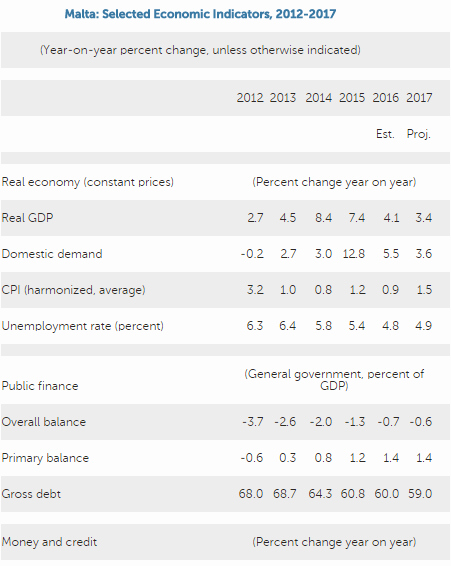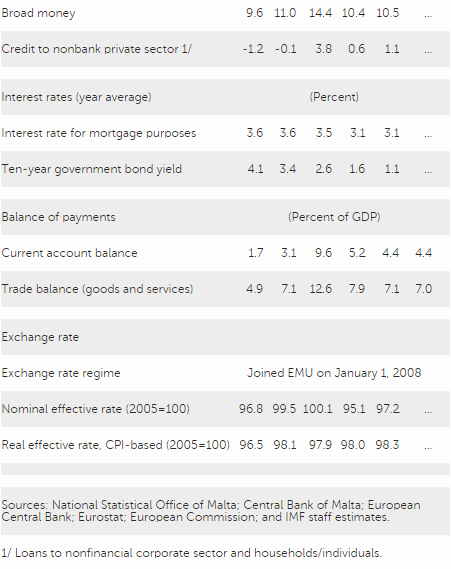IMF Executive Board Concludes 2016 Article IV Consultation with Malta
On February 17, 2016, the Executive Board of the International Monetary Fund (IMF) concluded the Article IV consultation with Malta.
Malta is one of fastest-growing economies in Europe. Following an average growth of nearly 8 percent in 2014-15, output is estimated to have expanded by 4.1 percent in 2016, supported by strong domestic demand. Robust job creation drove unemployment to record lows, despite rising labor supply, while subdued wage pressures contributed to low inflation. The external position remains strong, with sizable exports of services keeping the current account in surplus. Owing to buoyant revenues and consolidation measures, the 2016 fiscal deficit narrowed to an estimated level of 0.7 percent of GDP, well below the budget target of 1.1 percent of GDP, while public debt declined further to about 60 percent of GDP.
Domestic banks remain well-capitalized and liquid, with profitability well above the levels seen in European peers. Banks’ asset quality continues to improve, while measures have been taken to reduce legacy non-performing loans. Credit growth to the private sector was subdued as credit to the non-financial corporate sector contracted, but mortgage lending remained buoyant, resulting in higher household debt and further increase in banks’ exposure to property-related loans. Residential property prices showed a positive momentum in the face of rising demand and sluggish supply response.
The outlook is favorable, though growth is set to moderate to 3.4 percent in 2017 and converge to its potential of about 3 percent over the medium term as the impetus from domestic demand is projected to weaken. As a result, the output gap is expected to close, while the current account surplus is set to increase modestly. Strong job creation is likely to continue, keeping unemployment low, while inflation is expected to pick up as import prices recover. Favorable macroeconomic conditions, the low interest rate environment, and persistent primary fiscal surpluses are expected to bring down public debt as a proportion of GDP in the coming years.
Executive Board Assessment
The executive Directors agreed with the thrust of the staff appraisal. They commended the authorities for implementing sound macroeconomic policies, which have contributed to strong economic performance, robust job creation, low unemployment, and improved public finances. While noting that Malta’s medium-term outlook remains strong, Directors agreed that as a small and open economy, policies ahead should continue to focus on further enhancing the economy’s resilience to shocks and strengthening competitiveness. They welcomed the authorities’ commitment to building fiscal buffers, preserving financial sector stability, and implementing structural reforms to address the remaining impediments in the labor market, boost productivity, and ensure inclusive growth.
Directors commended the authorities’ medium-term fiscal consolidation plan, which strikes an appropriate balance between further lowering public debt and sustaining the growth momentum. To achieve the fiscal targets, they highlighted the need to enhance the efficiency of tax collection and contain the fast growing wage bill and spending on goods and services, including by building on the recommendations of the recent in-depth spending reviews. Directors agreed that further improving the financial health of SOEs and containing the long-term spending pressures would reduce fiscal risks.
Directors noted that the banking system is well capitalized and liquid, with profitability well above levels seen in peers. However, they observed that protracted low interest rates, weak credit growth, legacy corporate non-performing loans (NPLs), and an uncertain external environment pose challenges. In addition, banks’ high and increasing exposure to the property market alongside persistent house price appreciation could also lead to imbalances. They encouraged the authorities to deploy targeted macro-prudential tools to enhance the resilience of banks and households to property market swings, close data gaps, and review the fiscal incentives related to the property market. While there has been progress in reducing non-financial corporate sector’s legacy NPLs, Directors noted that a faster resolution of remaining distressed loans would help unlock resources for growth. They welcomed the authorities’ plans in this area, including their intent to streamline the insolvency and bankruptcy frameworks. Directors underscored that maintaining a robust implementation of the AML/CFT framework in line with international standards would also help continue safeguarding the integrity of the financial system.
Directors concurred that the planned Malta Development Bank could support the economy by alleviating financing constraints faced by small and medium-sized enterprises and by fostering higher development investment. However, they underscored the need to ensure that the Development Bank’s operations support the origination of new credit to viable firms, and encouraged the authorities to adopt well-designed origination rules. Directors also noted that a robust governance structure, prudent risk assessment, and adequate supervision will help mitigate contingent liability risks to public finances.
Directors highlighted that continued structural reform momentum is needed to support high and inclusive long-term growth. They called for sustained efforts to further increase female labor force participation and reduce skill mismatches in the face of changing labor market demand. Directors also underscored the need for further improvements in research and innovation and the efficiency of the judicial system.


Source: International Monetary Fund
- 336 reads
Human Rights
Fostering a More Humane World: The 28th Eurasian Economic Summi

Conscience, Hope, and Action: Keys to Global Peace and Sustainability

Ringing FOWPAL’s Peace Bell for the World:Nobel Peace Prize Laureates’ Visions and Actions

Protecting the World’s Cultural Diversity for a Sustainable Future

Puppet Show I International Friendship Day 2020

